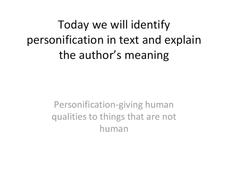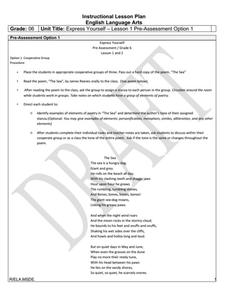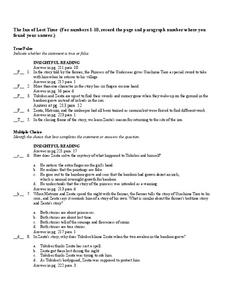K20 LEARN
It Wasn't Me: "The Crucible"
Scholars complete their study of the collective fear in Arthur Miller's "The Crucible" by conducting a mock trial to determine how many witches are in the class. Groups then analyze sections of the play for the literary devices used and...
Texas Education Agency (TEA)
Allusion (English II Reading)
The eighth lesson in a series of reading interactives focuses on allusions and what these literary devices add to a text. Readers examine examples of four types of allusions: mythological, religious, historical, and literary. They then...
Curated OER
Be the Poet
Students work through a Haiku Organizer to determine the characteristics they use to write eight haiku poems on a theme that they choose. They design presentation folders of their completed work.
Curated OER
Of Mice and Men: Chapter 3 Reading and Study Guide
Boost comprehension with an excellent reading guide for chapter 3 Of Mice and Men. Learners define four vocabulary words, note one allusion, define five literary terms, and respond to 31 short answer questions regarding the Steinbeck...
Curated OER
Satire
The bite of comedy often rests on use of the literary devices detailed in this presentation. The definitions for terms like sarcasm, zeugma, and invective are followed by examples drawn from literature. Consider extending the lesson by...
Curated OER
Personification
Introduce your young scholars to personification. The literary device is clearly defined and illustrated with clever examples. Opportunities for guided and independent practice using poems by Emily Dickinson and Langston Hughes are also...
Curated OER
Figurative Language
Explore literary devices and figurative language using higher level examples. The 33 slides here define common types of figurative language (like simile, metaphor, personification, etc.), and then focus on specific examples in...
K12 Reader
Alliteration Adventures
Assign a worksheet to reinforce the literary device of alliteration. Scholars choose a letter, brainstorm a variety of nouns, verbs, and adjectives that begin with that letter, then write three sentences using the words they listed.
Brooklyn College
Irony, Sarcasm, Satire
Irony, the discrepancy between what is expected and what occurs, is the focus of a reference sheet that provides young writers with models of this literary device.
K20 LEARN
Locating Archetypes in Pop Culture, Literature, and Life
Archetypes help readers connect literature to the world around them. A lesson plan uses elements of pop culture to teach about archetypal traits of common characters and discuss issues of perception and other literary devices. At the...
Texas Education Agency (TEA)
Syntax (English II Reading)
Lesson five in the series focuses on syntax and the elements that make sentences enjoyable. Learners practice building different clauses and phrases and using figures of speech and rhetorical and literary devices.
Texas Education Agency (TEA)
Paradox (English III Reading)
Pairs of contradictory words introduce learners to paradoxes, the literary device writers use to get readers thinking deeply about their messages. An interactive lesson uses poems by Emily Dickinson and Wilfred Owen and excerpts from the...
Curated OER
Epic Poetry: Literary Terms for Story Analysis
What do Star Wars, Indiana Jones, and The Odyssey have in common? Why, they are all epics, of course, and are presented here as examples of the literary term. If you are beginning a study of epics, consider previewing the terms included...
Curated OER
Literary Data Collection Chart
Here’s a matrix that could be used with any literary work. For each assigned passage, readers are asked to record information about characters, setting, vocabulary, literary devices, symbols, tone, mood, etc. In addition, they are asked...
Schools United to Provide Enhanced Resources Network
AP English Project: Journal of Literary Terms and Devices
To prepare for the AP English exams, individuals are asked to create a notebook of literary terms and devices. The terms must be defined, accompanied by representative artwork, and illustrated by an example drawn for a named source. A...
EBSCO Industries
Music and Poetry
Song lyrics, like poems, are meant to be heard. After examining the literary devices in several poems, scholars examine the lyrics of popular songs and identify the sound devices and the figurative language writers use to create the...
Curated OER
Setting the Story: Techniques for Creating a Realistic Setting
“It was a dark and stormy night.” Thus begins the 1830's novel Paul Clifford and, of course, all of Snoopy’s novels! Encourage young writers to craft settings for their stories that go beyond Edward Bulwer-Lytton’s often-mocked phrase...
Novelinks
Oedipus the King: Organizational Patterns
Designed for teachers of Sophocles' Oedipus the King, this packet provides information about themes and literary devices used in the play. Appropriate for first-time and veteran teachers of Sophocles' tragedy.
Lerner Publishing
Teaching Folklore
Wonderful worksheets and activities complementing six sequential lessons are what you'll find in this unit on folklore. Pupils create folktales using literary devices and included story starters, compare and contrast different folklores,...
Curated OER
Urban Legends
Irony, hyperbole, and other rhetorical devices are at play in this presentation about urban legends. Several examples of urban legends help to clarify the analysis, making it valuable for those who have a hard time wrapping their mind...
Curated OER
Analyzing Poetry
Use this poetry analysis worksheet to help your learners understand a poem of their or your choosing. This resource asks class members to summarize the poem and analyze it by looking at voice, word choice, imagery, and theme. The...
Curated OER
Allusion and Illusion: Definitions and Examples
Illusions and allusions certainly sound similar but there is a world of difference in their meanings. The narrator of this short video distinguishes between these terms, defines them, and offers examples that are sure to engage viewers....
Curated OER
Express Yourself Pre Assessment Lesson 1 & 2
Find out how much your class knows about literary elements with a quick pre-assessment. Pupils work first individually to identify the instances of personification, metaphor, simile, and more, and then with group members to determine the...
Wordpress
The Inn of Lost Time
Test understanding of "The Inn of Lost Time" by Lensey Namoika with an assessment that includes true/false, multiple choice, vocabulary, short answer, and essay questions. The test is not entirely traditional since, for the first 10...
Other popular searches
- Teaching Literary Devices
- Literary Devices and Terms
- Literary Devices & Quotes
- Common Literary Devices
- Literary Devices and Reading
- Introducing Literary Devices
- Literary Devices Irony
- Glossary of Literary Devices
- Literary Devices Inkheart
- Literary Devices Music
- Ell Literary Device Activity
- Literary Device Flashback

























